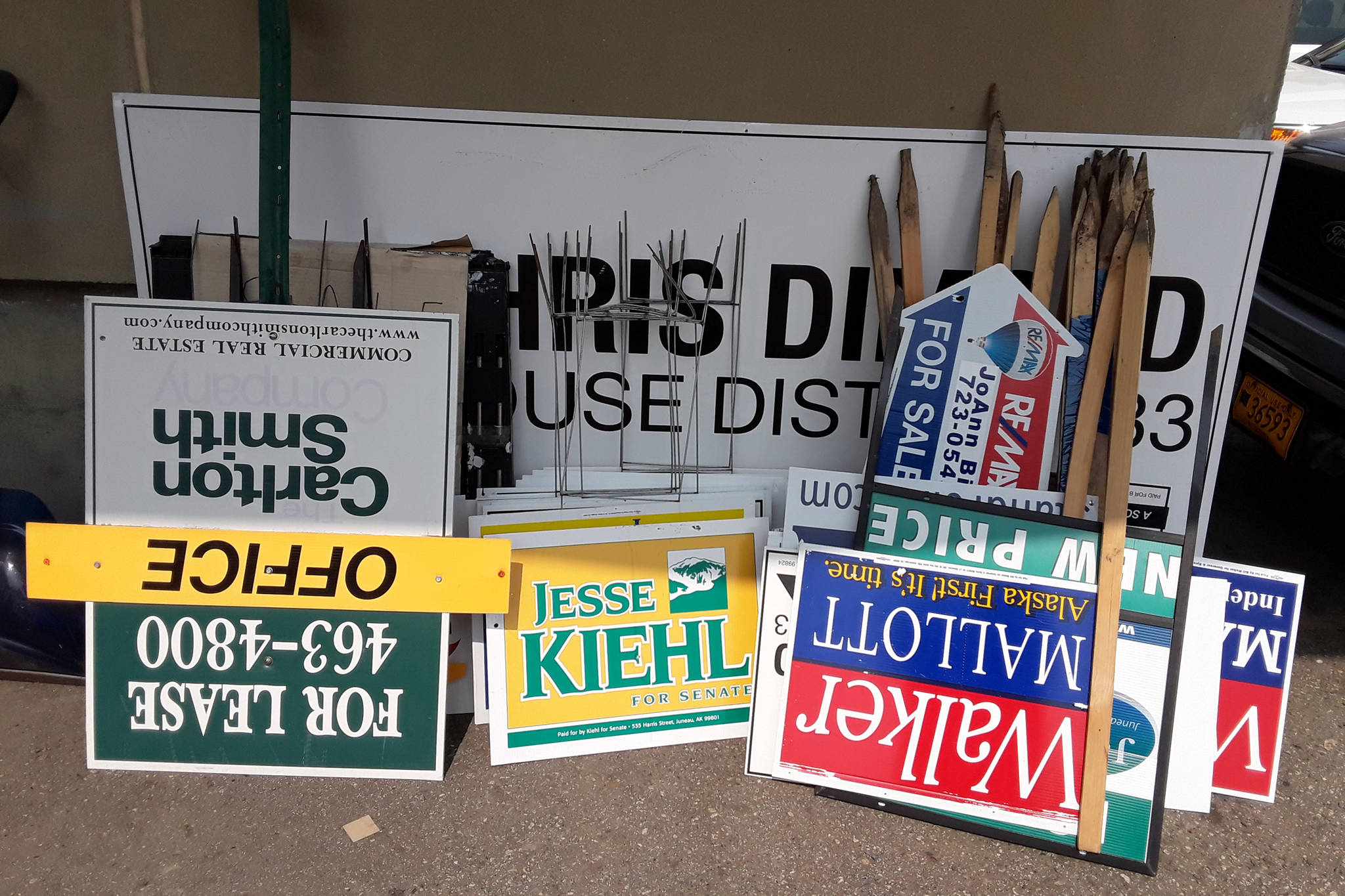They’re the signs of the times, and they’re causing problems.
On Thursday, the Alaska chapter of the American Civil Liberties Union joined the group Dunleavy for Alaska in a lawsuit against the state of Alaska, alleging the state is unfairly implementing a ban on outdoor advertising.
Since the start of election season, the Alaska Department of Transportation and Public Facilities has removed dozens of political signs across the state, impounding them for violating state law. Others have been the subject of takedown orders.
In the suit, the ACLU and Dunleavy for Alaska say the state is removing illegal political signs while leaving illegal nonpolitical signs alone.
“We don’t believe it’s appropriate for government to be discerning specific kinds of speech,” ACLU spokesman Casey Reynolds said by phone.
“If (Alaskans) want to express their political beliefs on their own property in a way that is not a safety concern … we believe they should be able to do that.”
The suit asks for an expedited hearing and an injunction against the Alaska Department of Transportation. The state has not responded to the suit, which has been referred to Anchorage Judge Herman Walker.
While the suit deals with a specific instance near Palmer, DOT has been confiscating signs along North Douglas Highway.
From Fairbanks, DOT spokeswoman Meadow Bailey shared a photo of more than a dozen confiscated signs held in impound at a DOT facility here. Some are real estate signs, but most are political markers.
The signs can be reclaimed upon payment of a small fine, but Bailey said some Juneauites have taken a different route: They’ve simply taken them without permission from the impound.
“We do not encourage this,” she said.
Many of the signs in Bailey’s picture are for independent Chris Dimond, who is in the race for House District 33, which covers downtown Juneau and Douglas Island.
“It’s unfortunate, but I understand,” Dimond said by phone of the confiscations.
Asked how many were taken by DOT, he replied, “enough signs to side an entire house.”
“The upside is DOT hired some people and put some people to work (to confiscate them),” he said.
Signs promoting Jesse Kiehl for Alaska Senate also appeared in the photo. Kiehl did not immediately respond to a call seeking comment. He was said to be traveling.
Some local candidates, including Democrat Sara Hannan (opposing Dimond in District 33) and Republican Jerry Nankervis (running to represent House District 34) said they have deliberately eschewed wide distribution of signs in order to avoid violating the law.
Nankervis, who spoke to the Empire on Tuesday, said that once a candidate gives away a sign, it passes into the hands of a homeowner, which makes it difficult to ensure that it doesn’t violate the law.
While the lawsuit comes in response to a crackdown in Anchorage, sign removals are no new thing in Juneau. In 2016, a DOT spokesman said the agency had removed “a few” from North Douglas.
The following year, amid municipal elections, DOT reminded locals of the rules again.
Reynolds said the lawsuit came about when “some mutual friends in the legal community” brought the ACLU and Dunleavy for Alaska together.
Dunleavy for Alaska is an independent group funded primarily by the brother of Republican gubernatorial candidate Mike Dunleavy. It has raised almost $770,000 to support the former senator’s election and is the source of most pro-Dunleavy signs in the state.
Alaska has had restrictions on outdoor signs since 1949, when the territorial legislature implemented a ban. The modern law is relatively straightforward: No outdoor advertising visible within 660 feet of a state highway right of way.
There aren’t any exceptions for political signs.
If a sign is in the highway’s right of way — the median or the verge, for example — state workers can remove it immediately. If it’s at someone’s roadside home, DOT is supposed to send a warning note telling the homeowner that she has 30 days to remove the sign. DOT can remove that sign immediately if it poses a safety danger by, for example, blocking the line of sight on a highway.
In addition to the signs removed by DOT, the Empire observed dozens still in place within the 660-foot forbidden zone.
“We recognize that advertising is an important effort and expensive investment. Each year we reach out to campaigns to remind them of Alaska’s laws. Entities are given notice before signs are removed, unless the sign is a safety hazard and in these instances the sign is removed as quickly as possible,” Bailey wrote by email.
No court date has been set for the lawsuit, but the request for injunction asks for action within 10 days.
• Contact reporter James Brooks at jbrooks@juneauempire.com or 523-2258.

